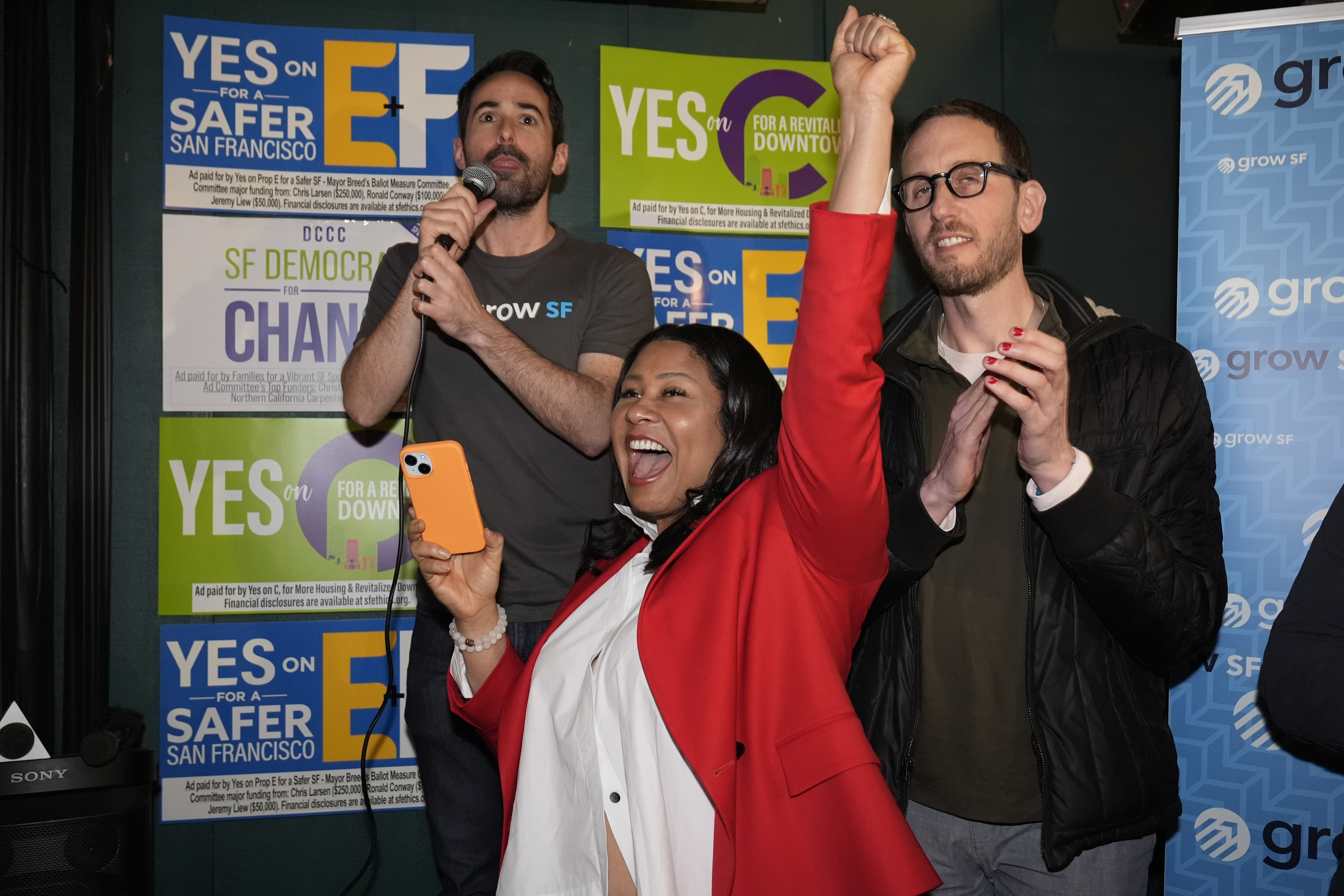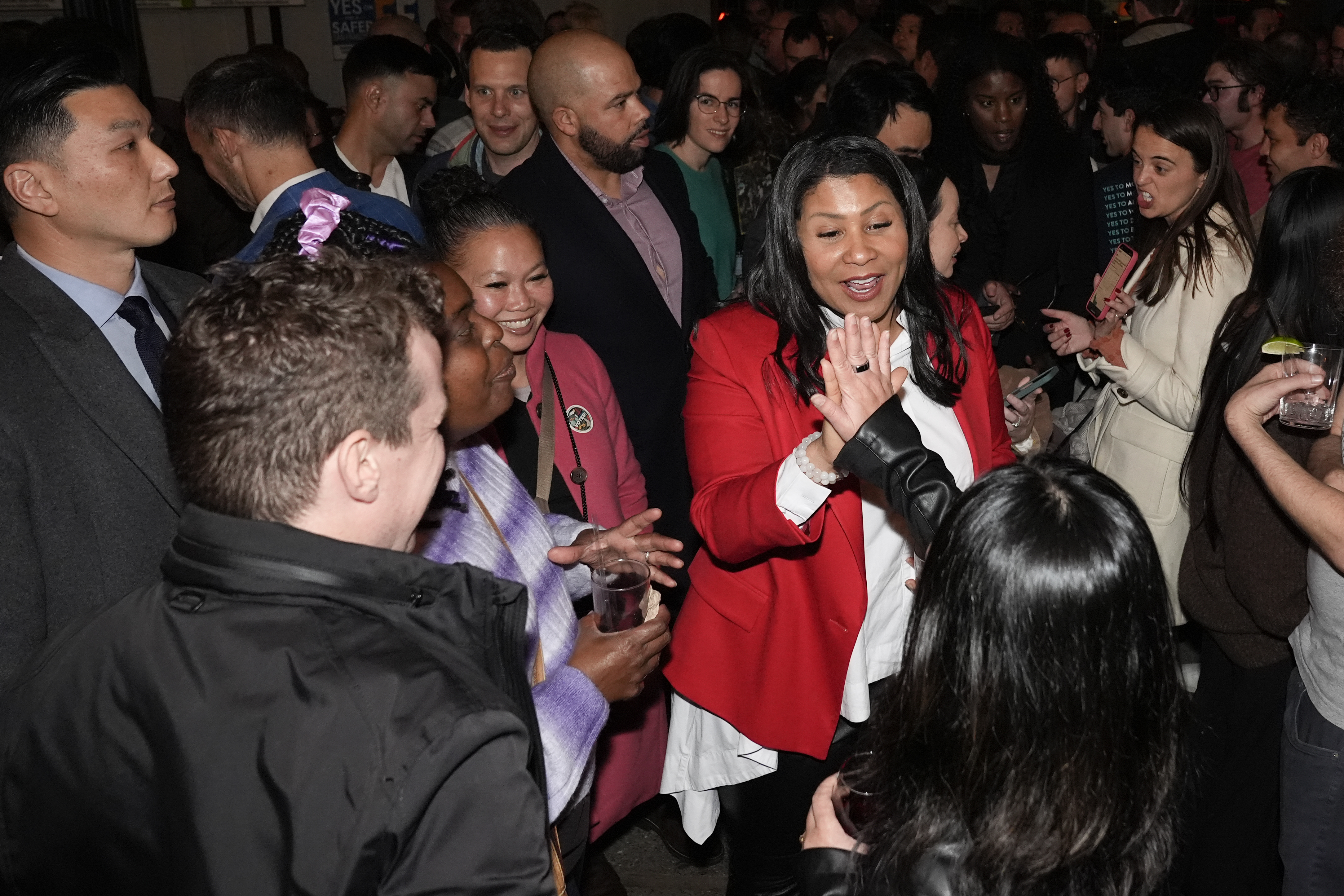San Francisco is linking welfare to drug screening and strengthening police powers in a stunning crackdown on crime
California politics, elections 2024, homepage news
Hannah WileyMarch 9, 2024
Mayor London Breed smiled Tuesday during a packed primary party in Hayes Valley, a boutique neighborhood about a half-mile from City Hall.
she stopped for selfies and congratulations as she navigated the crowded bar to a microphone.
“Change is coming!” Breed shouted to thunderous applause from the terrace of the trendy cocktail bar Anina.
Early results showed promise for a range of local candidates with a more centrist agenda, and for ballot measures that would transform the downtown with new development, calling on the city school board to reinstate Algebra I as a high school offering.
S
students.
But the focus of Breed’s excitement that night
were two was a pair
ballot measures she championed to expand police surveillance powers and impose drug treatment mandates that drew overwhelming voter support, a stunning shift to the right for a city nationally known for its progressive politics.

The first measure, Proposition E, strengthens police powers in the city. The second proposal, Proposition F, would require drug screening and treatment for people receiving welfare who are suspected of drug use.
The measures will boost efforts to tackle the outdoor drug addiction crisis, as well as the street crime and rampant homelessness that comes with it. Taken together, they lend credence to Breed’s message that San Francisco is not the bastion of lawlessness that critics like to claim.
“Enough is enough,” Breed said. “We need change.”
Breed faces a difficult re-election campaign
in
November, as she seeks a second full term. Two of her opponents Levi Strauss, heir and nonprofit founder Daniel Lurie, and venture capitalist Mark Farrell, a former county supervisor and interim mayor, are considered moderates by San Francisco standards and have criticized the mayor for the city’s street conditions and lagging post-pandemic. economic recovery.
A third opponent, Board of Supervisors Chairman Aaron Peskin, is a well-known progressive likely to gain support among staunch liberals concerned about the city’s recent shift toward the center.
As she navigates a middle path forward, Breed’s supporters hope the ballot victories will inject her reelection bid with a jolt of energy and chart a clearer path forward for a city that has struggled to get homeless people off the streets and recover from the pandemic-related exodus of the downtown tech sector.
“This is a really good evening for London Breed, ma’am
e
Mayor,” Sen. Scott Wiener (D-San Francisco) told the crowd. “This city has been beat up in recent years, and San Francisco is coming back, and it’s going to be even better than ever.”
The ballot measures approved Tuesday build on several initiatives Breed has led over the past year to strengthen the city’s efforts to end drug addiction and overdose deaths by adding punitive components to policies that target has concentrated for a long time on a gentler treatment-oriented approach.
Last fall, city officials announced plans for a law enforcement task force, set to launch in the spring, that will investigate opioid deaths and illegal drug trafficking in the city as possible homicides. Months ago, the Democratic Gov. Gavin Newsom deployed the California National Guard and California Highway Patrol to crack down on drug trafficking networks that funneled fentanyl into the Tenderloin and South of Market neighborhoods, an operation that has led to hundreds of arrests.
Breed claims these efforts are paying off: Over the past six months, property crime has fallen by 30% and violent crime by 4%, according to the mayor’s office.

Breed said the drug screening initiative will build on these efforts by pushing more people with substance use disorders into treatment.
Proposal F, which takes effect in January 2025, will…
c
ounty Adult Assistance Programs, which provides cash benefits to low-income single adults age 65 and younger without dependent children. Recipients will now be required to undergo drug screening if there is a “reasonable suspicion” they are struggling with a substance use disorder, and seek treatment if warranted.
Supporters say the change will protect the city’s resources from a street drug culture that has exploded because of San Francisco’s lenient policies and generous benefits.
The program helped approximately 5,700 people every month
in the 2022-2023 fiscal year, according to the city comptroller’s office, with some recipients receiving up to $712 per month. According to the mayor’s office, 141 people caught using drugs in public spaces also received support from the province between March 30, 2023 and early February. Of those, 33% did not actually live in San Francisco.
“This just adds another level of responsibility of screening, and hopefully this will lead to the kind of results we want to see: people in treatment and people ultimately getting clean and sober,” Breed said.
Critics of Proposition F dismiss it as a poorly crafted proposal that fails to address the roots of the city’s homelessness crisis:
ignited
lack of affordable housing and quality treatment options. They reiterated a popular progressive principle that forcing people into drug treatment doesn’t work, and said the policy changes will have devastating consequences for low-income residents who rely on the assistance for housing and other necessary expenses.
“It will just make treatment less accessible to everyone in San Francisco,” said Jeannette Zanipatin, state director of the left-leaning nonprofit Drug Policy Alliance. “Selling an initiative with false promises actually means that the mayor and her office are choosing political convenience over actually trying to roll up their sleeves and find real solutions that will actually have an impact on the overdose crisis.”
The measure is not drafted with specific rules on how drug screening will be conducted or how treatment will be enforced. Breed has ordered the city’s Human Services Agency to create an “action plan” for implementation, meaning it could be months before official guidance is available.
Breed’s office has said the measure was deliberately designed to be flexible in terms of treatment
.
Treatment options can range from outpatient services to a prescription for buprenorphine, a medication used to treat addiction. They noted that there is no requirement for participants to maintain sobriety, and acknowledged that people often fall into recovery and should not be kicked out of the program because of a mistake.
“I don’t think Proposition F is as bad as its critics say it is, and it probably won’t be a panacea like some of its more ardent supporters said it was,” said Supervisor Matt Dorsey, a moderate Democrat who has been outspoken about his own addiction recovery journey. “But I do think about balance, it’s a step in the right direction.
Wiener, one of the Capitol’s leading progressives, did not support Proposition F but said he understands why people voted for it. “Only by San Francisco standards would this be considered moderate,” he said. “As in many cities now, there are concerns about public safety and public drug use and people want their neighborhoods and their city to be the best they can be.”
Proposal E, the measure strengthening police powers, was also successfully passed. The measure weakens some oversight authority of the Police Commission, which has been a voice in curbing police use of force.
The measure also eases restrictions blamed for promoting a lax police response to retail and property crimes. It gives the police more leeway to pursue suspects by car and gives officers the option to use drones in certain pursuits. The changes also relax requirements for documenting suspicious encounters that lead to the use of force by police and allow body camera footage to replace certain paperwork.
Proponents of Proposition E said it will reduce the amount of time police spend on administrative tasks and ensure they are well-equipped with technology to fight crime. Opponents see a disturbing cut in less transparency and supervision.
“It made it easier for the SFPD to cover up police brutality and makes it harder for the public to hold police officers accountable,” said Yoel Haile, director of the Criminal Justice Program at the ACLU of Northern California. “What we see happening now is politicians offering the public these tried and failed solutions as the magic solution to real frustrations people have about crime and public safety.”
Breed makes no apologies.
On Thursday, she delivered her State of the City address at Pier 27, a waterfront venue with a stunning backdrop of the city skyline.
She sharply refuted the narrative that San Francisco had lost its progressive course, arguing instead that Tuesday’s election results aligned with the city’s liberal values of housing and treating people suffering from addiction and providing communities with quality police supervision.
During her speech, she emphasized the message that San Francisco is turning a corner, calling it a “city on the rise.”
“San Francisco no longer carries the shackles of your negativity,” she said as applause echoed in the room.
Fernando Dowling is an author and political journalist who writes for 24 News Globe. He has a deep understanding of the political landscape and a passion for analyzing the latest political trends and news.



